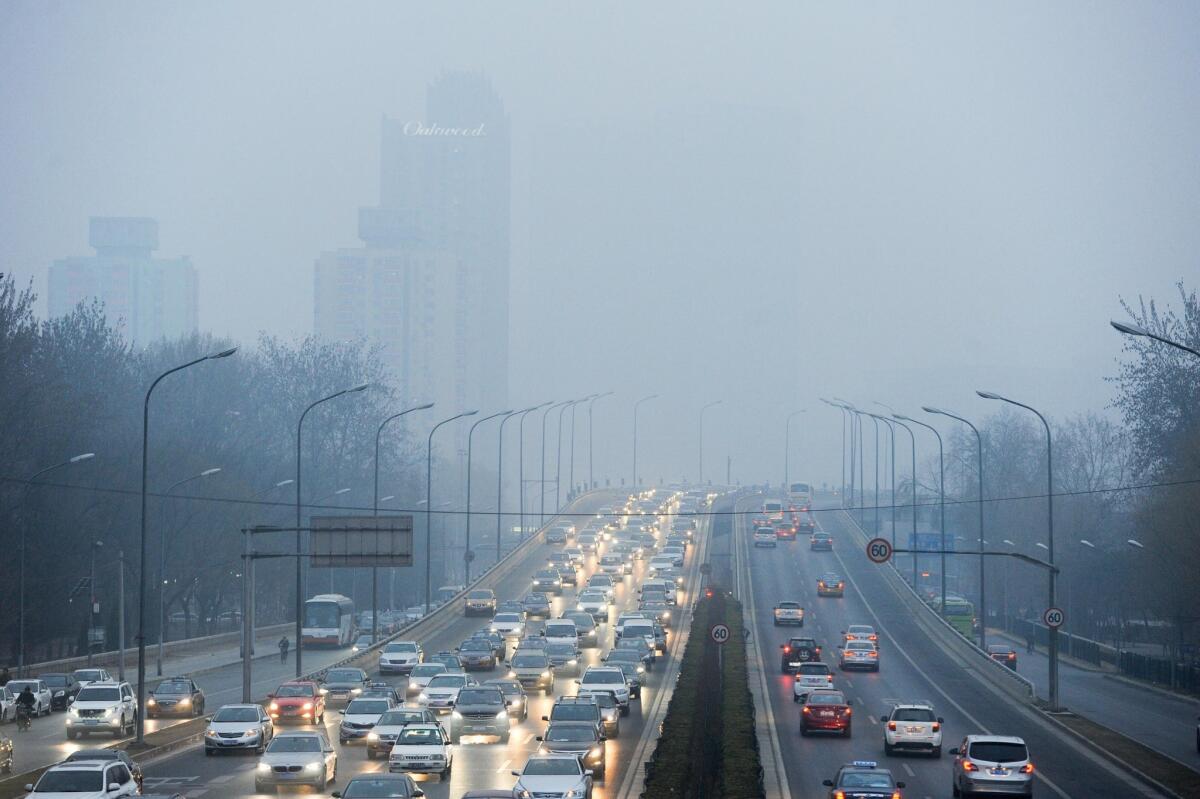Study says pollution may have reduced birth weights in Beijing

- Share via
Reporting from New York — Exposure to air pollution may reduce the weight of newborn children, according to scientists who studied birth weights in Beijing before, during and after the 2008 Summer Olympic Games, when Chinese government controls temporarily reduced the city’s often-hazardous smog levels.
In a study released Tuesday in the journal Environmental Health Perspectives, an international team of researchers compiled information on births from 83,672 mothers across four Beijing districts. The study says that women who were eight months pregnant during the 2008 Olympics, which ran from Aug. 8 through Aug. 24, gave birth to children who were on average 23 grams heavier than infants born during the same period in 2007 and 2009.
“We think pollution has an effect on birth weight,” said David Rich, an epidemiologist at the University of Rochester and the study’s lead author. “And the next question is: By what mechanisms? It’s not just one study that’ll answer that. It’ll be a lot of work by a lot of different people.”
The study’s authors included scientists from the Capital Medical University and Chinese Research Academy of Environmental Sciences in Beijing, as well as others from Rutgers University, UC San Francisco and Duke University.
China is only beginning to understand the long-term effects of its noxious air, water and soil pollution, the products of three decades of unchecked economic growth. Air pollution, which manifests in a toxic smog perennially engulfing most major Chinese cities, accounted for 1.2 million premature deaths a year nationwide in 2010, according to a study in the Lancet, a British medical journal.
Soaring levels of air pollution in northern China, much of it caused by an over-reliance on coal-fired power plants, cause northerners to die an average of 5.5 years earlier than their southern counterparts, according to a 2013 study published in the scientific journal Proceedings of the National Academy of Sciences.
China’s pollution controls during the Olympics included restricting cars, halting construction, shuttering factories and seeding clouds to adjust the city’s weather patterns.
In March, Chinese President Xi Jinping promised to crack down on polluters with an “iron fist.” Last spring, Premier Li Keqiang vowed to wage “war against pollution.”
Yet analysts have still found a discrepancy between the government’s rhetoric and the country’s smog-choked reality. Chinese researchers gathered data from 360 Chinese cities and found that 90% of them failed to reach the government’s air quality standards during the first three months of 2015, according to a report released last week by the environmental nonprofit Greenpeace.
Levels of airborne particles less than 2.5 micrometers in diameter, small enough to lodge themselves deep within the lungs, dropped in Beijing over the last year, while conditions in cities across China’s central and western provinces have worsened, the Greenpeace report found.
“Our analysis shows that the government’s strict pollution control measures are working, at least enough to record a modest improvement on last year in certain cities such as Beijing,” Zhang Kai, climate and energy campaigner at Greenpeace East Asia, said in a statement. “However this is the only silver lining in a situation where 90% of cities still record levels of pollution that far exceed China’s own air quality standards.”
Angel Hsu, an expert on China’s environment at the Yale School of Forestry and Environmental Studies, said Chinese officials severely restricted research into the relationship between air pollution and public health until 2013, when public pressure to confront the issue became too great to ignore.
“I think the fact that people from foreign institutions are now able to do these kinds of studies is significant,” she said. “[Officials] were trying not to be specific about the health implications of unfettered growth for such a long time.”
Twitter: @JRKaiman
More to Read
Sign up for Essential California
The most important California stories and recommendations in your inbox every morning.
You may occasionally receive promotional content from the Los Angeles Times.













